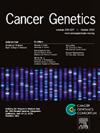41.ClinGen FLT3 体癌基因变异整理专家对 FLT3 变异致癌评估的第二步更新
IF 1.4
4区 医学
Q4 GENETICS & HEREDITY
引用次数: 0
摘要
变异解释指南有助于遗传学专业人员评估变异致病性和临床意义的证据强度。目前,还没有评估 FLT3 变异的标准指南,导致对 FLT3 酪氨酸激酶和非酪氨酸激酶变异的解释存在差异。FLT3体癌基因变异鉴定专家小组(SC-VCEP)隶属于ClinGen体癌CDWG,该小组正在利用ClinGen/CGC/VICC(PMID: 35101336)积极制定FLT3基因变异致癌性解释规则,以促进FLT3变异的准确分类。针对 OP1/SBP1,我们评估了多种硅学预测工具及其在 FLT3 特异性变异上的表现。根据分析结果,我们选择 ClinPred 和 REVEL 作为最佳预测工具,在试验阶段进行进一步评估。我们还利用 FLT3 变异的等位基因频率谱修改了 OP4/SBS1 的人群等位基因频率标准。考虑到内部串联重复(ITD)变异的适用性需求,我们将该变异类型的 OM2 强度提高到了 OM2_strong。通过这些更新,我们对所有规则进行了评估,并对 OVS1、OS2/SBS2、OS3/OM3/OP3、OM1、OM2、OP1/SBP1、OP2、SBVS1 和 OP4/SBS1 提出了修改/规范建议。一旦获得批准,将在一组试点变体上对规则的有效性进行评估。本文章由计算机程序翻译,如有差异,请以英文原文为准。
41. Step 2 updates for the oncogenic assessment of FLT3 variants by the ClinGen FLT3 somatic cancer variant curation expert
Variant interpretation guidelines aid genetic professionals in assessing the strength of evidence for the variant pathogenicity and clinical significance. Currently, there are no standard guidelines for evaluation of FLT3 variants, leading to variability in interpretation of FLT3 tyrosine kinase and non-tyrosine kinase variants. The FLT3 Somatic Cancer Variant Curation Expert Panel (SC-VCEP), within the ClinGen Somatic Cancer CDWG, is actively developing the variant oncogenicity interpretation rules for the FLT3 gene using ClinGen/CGC/VICC (PMID: 35101336) to facilitate accurate classification of FLT3 variants.
We will provide an update on the FLT3-specific modifications to evidence criteria OP1/SBP1 and OP4/SBS1. To address OP1/SBP1 we assessed multiple in silico prediction tools and their performance on FLT3-specific variants. Based on the analysis, we selected ClinPred and REVEL as optimal prediction tools for further evaluation during the pilot phase. We also modify the population allele frequency criteria for OP4/SBS1 using the spectrum of allele frequency of FLT3 variants. Recognizing the need for applicability to internal tandem duplication (ITD) variants, the strength of OM2 has been increased to OM2_strong for this variant type. With these updates, all rules have been evaluated and modifications/specifications proposed for OVS1, OS2/SBS2, OS3/OM3/OP3, OM1, OM2, OP1/SBP1, OP2, SBVS1, and OP4/SBS1. Once approved, the validity of the rules will be assessed on a set of pilot variants.
求助全文
通过发布文献求助,成功后即可免费获取论文全文。
去求助
来源期刊

Cancer Genetics
ONCOLOGY-GENETICS & HEREDITY
CiteScore
3.20
自引率
5.30%
发文量
167
审稿时长
27 days
期刊介绍:
The aim of Cancer Genetics is to publish high quality scientific papers on the cellular, genetic and molecular aspects of cancer, including cancer predisposition and clinical diagnostic applications. Specific areas of interest include descriptions of new chromosomal, molecular or epigenetic alterations in benign and malignant diseases; novel laboratory approaches for identification and characterization of chromosomal rearrangements or genomic alterations in cancer cells; correlation of genetic changes with pathology and clinical presentation; and the molecular genetics of cancer predisposition. To reach a basic science and clinical multidisciplinary audience, we welcome original full-length articles, reviews, meeting summaries, brief reports, and letters to the editor.
 求助内容:
求助内容: 应助结果提醒方式:
应助结果提醒方式:


